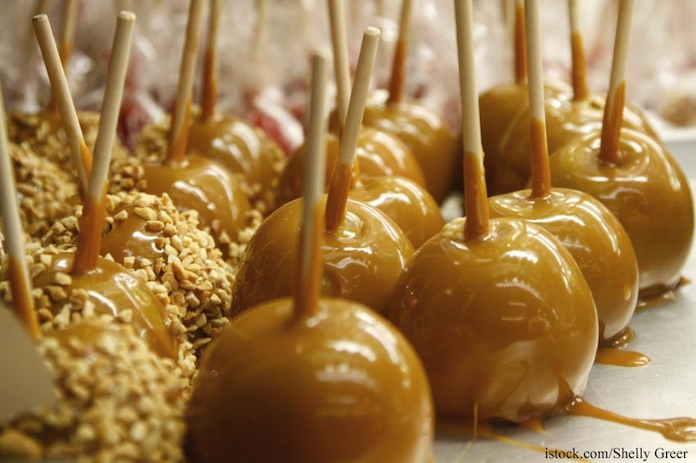Caramel apple season is here. If you choose to make your own or buy commercially prepared caramel apples, be aware of the dangers of food poisoning. A 2014 Listeria monocytogenes outbreak linked to caramel coated apples sickened 35 people. Listeriosis contributed to at least three of the seven deaths reported in that outbreak, according to the CDC. Eleven of the 35 people sickened were pregnant. One woman lost her baby.

Twenty-eight of the 31 ill persons interviewed ate commercially produced, prepackaged caramel apples before they got sick. This outbreak was surprising, since the pH of apples is too low, and caramel is too high in sugar and therefore low in free water to support Listeria monocytogenes bacterial growth.
The law firm of Pritzker Hageman, which underwrites Food Poisoning Bulletin, filed several lawsuits in that outbreak. One was on behalf of a Minnesota man who ate Bidart Brothers caramel apples. Another was on the behalf of a woman from New Mexico and her newborn son. The baby was diagnosed with listeriosis after his premature birth, and was hospitalized for weeks.
The outbreak investigation revealed that commercially produced, prepackaged caramel apples made from Bidart Brothers apples were the likely source for this outbreak. But how did this pathogenic bacteria grow on these apples?
A study conducted at the University of Wisconsin-Madison’s Food Research Institute solved the mystery. It seems that unrefrigerated caramel apples will support Listeria growth because of the sticks inserted into them.
The study showed that sticks inserted into the core of the bacteria “accelerates the transfer of juice from the interior of the apple to its surface, creating a microenvironment at the apple-caramel interface where Listeria monocytogenes can rapidly grow to levels sufficient to cause disease when stored at room temperature.” The researchers studied several scenarios for caramel apple production.
Apples were inoculated with Listeria monocytogenes before they were dipped into caramel. Some of the apples had sticks inserted before dipping and others did not. No growth of Listeria bacteria occurred on refrigerated caramel apples that did not have sticks. Slow growth was observed on refrigerated caramel apples with sticks. Remember that Listeria monocytogenes bacteria can grow at refrigerator temperatures. But, significant pathogen growth was observed within three days on caramel apples with sticks that were stored at room temperature.
The results of this study point out two things. First, food producers should always consider interfaces between the different components of a food as potential areas where pathogens can grow. Second, if you buy or make caramel apples, keep them refrigerated. Refrigeration can slow the growth of any Listeria bacteria that may be present and may keep the levels of pathogenic bacteria below an infective dose.




